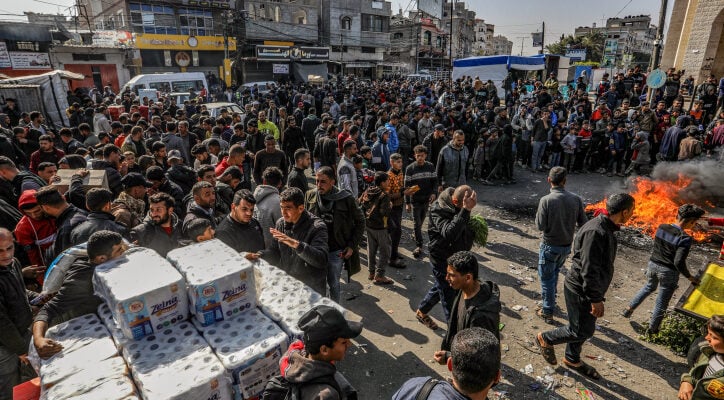‘Hamas must be held accountable for deliberately interfering with efforts to provide the passage of aid to the civilian population in Gaza,’ the researchers said.
By Pesach Benson, TPS
Israel has been allowing adequate amounts of food into Gaza, and a famine would most likely be caused by theft of food, Hamas rocket attacks on border crossings, and faulty distribution, an academic working paper has concluded.
The report, which will be peer-reviewed, is based on the findings of researchers from Tel Aviv University, Hebrew University, the University of Haifa, Ben-Gurion University of the Negev, Ramat Gan’s Sheba Medical Center, the Shaare Zedek Medical Center in Jerusalem, and the Israeli Health Ministry.
“Our results suggest that if famine were to occur in Gaza, it is unlikely to be due to any limitations posed by Israel on the food supply entering the Gaza Strip,” the 31-page study concluded.
“Rather, the issues may be related to how food aid is distributed, made accessible, and utilized by the population once it reaches Gaza. Several key factors hinder efforts to increase the amount of aid reaching civilians in the Gaza Strip, which must be addressed in further research. These include theft, looting, and hoarding of food and other supplies, abetted by Hamas or others, and limit of the capacity of Israel and international organizations operating inside Gaza to ensure access,” it said.
The researchers assessed the quantity and nature of food deliveries to Gaza to see if they meet benchmarks for food security, nutrition, and food aid based on guidelines set by Sphere, an initiative of various non-governmental organizations.
Standards set by the Geneva-based Sphere are widely recognized and utilized by the international humanitarian community.
The researchers examined the registry kept by Israel’s Coordinator of Government Activities in the Territories of all food aid delivered to Gaza via air and land between January-April 2024.
COGAT is a unit within the Israeli Defense Ministry responsible for overseeing humanitarian aid deliveries.
The study said COGAT’s data was more comprehensive than figures provided by the United Nations Relief and Works Agency, and included, for example, data from national and private sources, and details such as the total weight of each aid delivery.
“Between January and April 2024, 14,916 trucks conveying 227,854 tons, and 95 airdrops weighing 3,694 tons of food entered Gaza. On average, 3,729 food trucks per month entered Gaza, with a continuous increase of 431 trucks per month since January. Between January and April, the overall weight of food shipments increased by 57%, as did the diversity of food items.”
During this period, deliveries of fruit increased 2,851% from the previous quarter. Deliveries of vegetables increased 2,657%, and dairy and eggs increased 934%. Deliveries of nuts and seeds, potatoes and chicken, meat and fish also saw dramatic increases.
“The crude mean per capita per day energy supplied was 3,374 kcal, protein was 101 gr (12.1% of energy), fat was 80.6 gr (21.5% of energy), and iron was 25.2 mg. Energy, protein, and fat amounts exceed Sphere recommendations. Although the amount of iron supplied improved over time, it remained lower than the Sphere standard,’ the report said.
“Our data shows that the food entering Gaza meets or exceeds the calorie, protein, fat, and recently also the iron requirements of the Sphere standards for humanitarian aid delivery to crises-affected populations. Yet delivery alone is not sufficient. Ensuring the population’s equitable distribution and access to humanitarian aid requires a sustained cooperative effort,” said the study.
Regarding Hamas, the report stressed, “It must also be mentioned that military attacks by Hamas at humanitarian aid crossing points and corridors interrupt humanitarian efforts,” citing Hamas rocket fire at humanitarian zones, Israeli forces protecting humanitarian corridors, the Kerem Shalom border crossing, a US-built offshore pier, and even a water desalination plant funded by the international community.
“Hamas must be held accountable for deliberately interfering with efforts to provide the passage of aid to the civilian population in Gaza,” the researchers said.
When Hamas slashed food prices in April, Gaza residents told The Press Service of Israel that the problem wasn’t a lack of food but a shortage of money for families to purchase it.
At least 1,200 people were killed, and 252 Israelis and foreigners were taken hostage in Hamas’s attacks on Israeli communities near the Gaza border on October 7. Of the 120 remaining hostages, more than 30 are believed dead.





